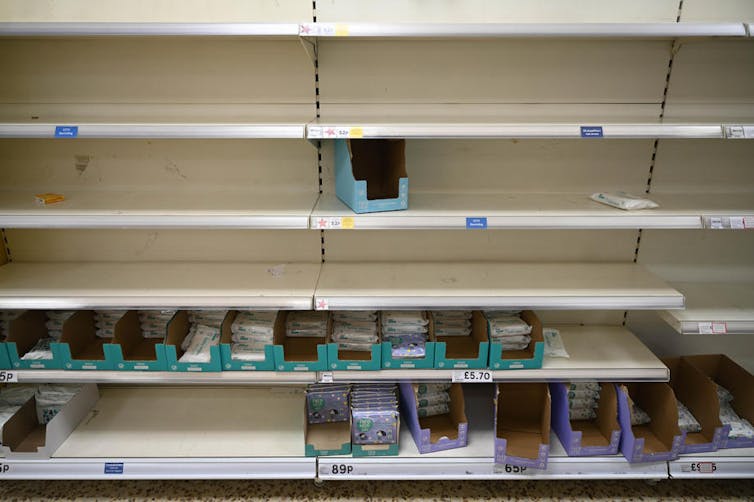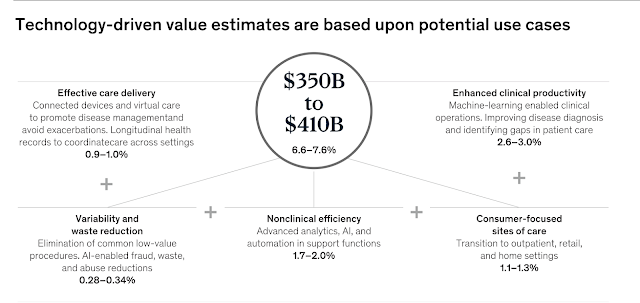Artificial Intelligence and Goods Distribution in the COVID-19 Scene
If you are staying in the United States right now, you might know that toilet paper, hand sanitizer, and some other essential products are out of stock pretty much everywhere. In all honesty, panic buying can be accused of most of these purchases and one might arguably defend themselves from the virus without stocking up these essential items since there are a lot of alternatives (body wash, bidets,...).
Empty shelves are seen in the hand sanitizer section in a north London supermarket on March 12, 2020 (Source)
In 2012, Hurricane Sandy caused severe damage to many states in the country. In an effort to relief from the hurricane, Palantir used their A.I. data analytics tool to organize volunteers to guarantee the most efficient humans and goods distribution to affected areas (source). The same approach can be taken to distribute masks and ventilators to those in need instead of blindly shipping supplies to those who are not as in need and having to recall them later on. With a lot of manufacturers shifting to produce masks and ventilators, it is important for firms to make agreements and avoid making any mistakes such as overlapping shipments or leaving out any areas. One of the most efficient ways to solve this issue depends on the government releasing such A.I. distributional system to coordinate firms so that all hospitals around the country have access to medical facilities according to their needs.
We have dealt with difficult times before with the assistance of A.I.
It's not too late to join forces with A.I. to fight COVID-19 today
(Picture: Hurricane Sandy, Source)
All in all, this time is a crucial time for us to realize and utilize technology in our fight against COVID-19. Let’s not forget that we have many powerful tools in hand and A.I. can solve the issues we are facing better than any of us could.

/cdn.vox-cdn.com/assets/1650963/Screen_Shot_2012-10-29_at_11.11.01_AM.png)


In the case of a shortage of supplies how would an AI decide how to distribute them? If there's no way for everyone to get what they need, how would an AI decide who needs it most?
ReplyDeleteFor the case of the U.S. at the moment, I don't think there will be a complete shortage of supplies, but rather an unreasonable distribution of goods among the community. People are purchasing way way more paper towel than what they actually need, which makes paper towel unavailable for others who need it as well.
DeleteIf there is a complete shortage, I don't think any A.I. or human could solve that problem. The best attempt is to let everyone consume a little less than they want/need and try to get goods to everybody.
Yeah, I'd have to agree with Maegan. My mom works in the blood bank of a hospital and she's always talking about how they're having shortages or having to send stuff to other places and having to delay surgeries because they don't have the required stock. Especially right now, not many people are donating blood, so they have to be more conservative and make sure no blood goes to waste.
DeleteI think an AI would be a perfect solution to distributing essential supplies if the government already had everything stockpiled and ready for distribution. Since we have a capitalist economy, supplies like masks and ventilators are produced by manufacturers and sold to those who need it. I'm having a hard time believing companies will listen to the AI and sell the materials to one location when they could sell it for more elsewhere. Unfortunately, the law of supply and demand doesn't pause during a global pandemic.
ReplyDeleteThat makes perfect sense to me. I think my blog post based entirely on the humane aspect of the society and I assumed (and hoped) that everyone wants the pandemic to end with the least casualty. Unfortunately, a lot of people don't have that mindset.
DeleteUsing AI to determining good distributions is a great way to affirm people that they will not need to stocked up as more stuff are on the way. However, I have the same questions as Maegan. When there is a shortage of supplies and between poor and rich places with the same needs, how would the AI decided?
ReplyDeleteSimilar to my response to Maegan's comment, I think the A.I.'s main purpose is to distribute goods equally to everyone to avoid panic-buying and the scenario of a portion of population have access to too much goods while the other portion doesn't have anything available.
DeleteWith that being said, the A.I. would try to distribute the goods based on people's actual needs, not how rich they are.
I get your points and think that using AI to distribute goods would be much more efficient. However, I also think that this will not work in a big scale: for example, why would China want to use this technology to distribute their masks/ventilators while they could accept a triple bill for a on-the-way package? Furthermore, assume that China uses this technology, then lots of heated debates about the fairness in distribution would arise since it's hard to determine what 'fairness' is.
ReplyDeleteI agree, it's really hard to judge 'fairness', especially in a capitalist society. The problem I really want to solve using such A.I. is panic-buying, which leaves some people with too much goods and some with nothing to use. I know that in March or sometime early this year, a lot of people panic-bought paper towel and toilet paper and have to go back to return those goods. That's really tough for some people who have to live without such staples.
DeleteTopic well chosen, Minh. I wouldn't be surprised if AI is capable of distributing goods fast, efficiently, and evenly. However, if there is a situation that cause a shortage in supplies, what would you think will happen? Would there be bias toward a certain group of people?
ReplyDeleteI think the A.I. would try to match people's need at its best in that case. For example, it'll probably decide that the group of elderly needs more paper towels than the group of younger people and try to adjust goods distribution so that everyone doesn't have to live with a shortage of anything.
DeleteThat does sound like a great way to approach the problem. But that also means that if it is always putting the elderly first, then it might overlook a few young people who might need it more than the elderly. However, it is not a perfect technology, and it's not like humans do a perfect job, either...
Delete